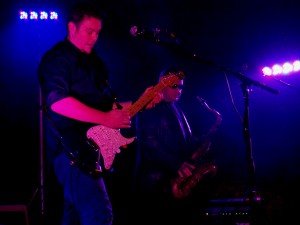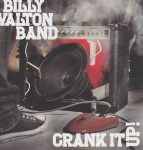 If you’re a regular visitor to MusicRiot, you may have noticed that we’re keeping a close eye on the Billy Walton Band here at Riot Towers. There’s a simple reason for that; they’re very good.
If you’re a regular visitor to MusicRiot, you may have noticed that we’re keeping a close eye on the Billy Walton Band here at Riot Towers. There’s a simple reason for that; they’re very good.
“Crank It Up!” is the fourth album from the Billy Walton Band, following 2 studio albums and a live set recorded at The Stone Pony in Asbury Park. Billy Walton and bass player William Paris have been together from the start, playing alongside various studio and live players to bring the Billy Walton Band to the world.
First of all, if you haven’t read any reviews of the Billy Walton Band live, you need to know that Billy Walton is a great guitar player. The first 2 studio albums (“Billy Walton Band” and “Neon City”) tended to focus on the guitar playing, although the songs “Neon City” and “Soul Song” on the second album also show a genuine songwriting talent emerging.
For the third studio album, there are a couple of crucial differences to the mix. First of all, Billy Walton is writing with keyboard player Randy Friel who also plays on the album. Secondly, the band is also joined by tenor sax player Richie Taz but more about that later.
Conventional wisdom says that you open the album with a big track and the title track “Crank It Up” covers that one from the opening riff. It’s a big good-time song featuring a horn section and it wouldn’t have sounded out of place on either of the first two albums. You could probably say the same for the second track “Lifeline” where the intro gives a brief nod in the direction of Keith Richards and features the first low-key contribution from Richie Taz. Both tracks are good, but they only give a taste of the quality to come.
“Summertime Girl” feels like Springsteen’s Jersey shore twenty years down the line, and an arrangement which features piano and organ accentuates the E Street Band feel of the song. If this song was on a Bon Jovi or Springsteen album it would be a Top 40 single. “The Deal Went Down”, later on the album, has the same personal Jersey feel with a nod in the direction of The Boss’s “Spirit in the Night” and more great sax from Richie Taz.
“Deal with the Devil” is a country blues which again demonstrates Billy’s versatility, featuring acoustic guitar, where he rejects the bargain that Robert Johnson made. “Till Tomorrow” is another song which is strong lyrically, features great horns in the chorus, plenty of hooks and a lovely understated guitar solo leading to the fadeout. “One in a Million” and “Hot Blues” are both firmly back in blues territory, taking the album full circle back to the rock-out ending of “Black Jack Dealer” featuring a vocal from William Paris.
By any standards, this is a good album which you really should be listening to if you like real songs and real instruments. It’s an important step for the Billy Walton Band because the playing is as good as ever but the songs here are better and more personal than on the previous 2 studio albums and the band line-up and arrangements seem to work together much better.
You can get a copy at www.billywaltonband.com or, even better, go watch the band live when they tour the UK in April and buy a copy there; a great night out and a great album to take home with you. What more could you want?
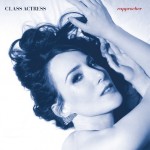 Class Actress, aka Brooklyn based singer Elizabeth Harper and producer Mark Richardson’s, debut album could have been released at any time during the peak of the brief, but surprisingly influential, Electroclash movement of 2001-2003. It’s self-conscious, ironic and armed with relentless synths and arch female vocals but unlike the majority of the music released during this period it doesn’t reference cocaine, sunglasses or Frank Sinatra.
Class Actress, aka Brooklyn based singer Elizabeth Harper and producer Mark Richardson’s, debut album could have been released at any time during the peak of the brief, but surprisingly influential, Electroclash movement of 2001-2003. It’s self-conscious, ironic and armed with relentless synths and arch female vocals but unlike the majority of the music released during this period it doesn’t reference cocaine, sunglasses or Frank Sinatra.
Elizabeth Harper is in her own film noir; she’s been to the club, she’s left the bar with The Man and he won’t be there in the morning and this album tries to provide a smudgy, woozy musical imprint of that evening; thing is I’m not sure if we’ll be there for breakfast either. Her vocals are reminiscent of the late 1980s Ze records icon Cristina, all cut-class vowels and a register much deeper than we’re used to hearing from this particular genre; odd Harper’s a Brooklyn girl, she sounds more like an Upper East Side Manhattanite.
‘Rapprocher’ suffers from severe front loading, the first three tracks are the best songs on the album, ‘Love You Like You Used To’ in particular hitting a perfect stride with tense, foreboding synths and Harper’s crystal clear pleading, it’s a pretty intoxicating mix. BPMs barely get above 110 and by track 7 you long to change the pace a little and the song writing begins to suffer greatly. It’s a shame because there’s a great EP here (check out their excellent, slightly rougher around the edges EP that proceeded this album; ‘Journey of Ardency’) and some brilliant, very high quality synth work.
Things do pick up again with the disorientating and interesting ‘Hanging On’ where Harper’s breathless list of bedtime favourites really does feel, er, authentic and ‘Bienvenue’ sounds a bit like an electronic, poppier Pretenders but they will need to pull something bigger and more engaging out of the bag song-wise to get the attention they will need in order to make the great album that’s hopefully in them somewhere.
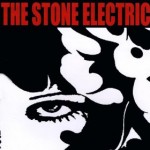 OK; I’ll admit it, I’m a bit slow out of the blocks with this one even by my standards. This album was released in 2009, but I happened to see the band a few weeks ago at a London gig and a copy was stuck into my grubby mitt so here we go.
OK; I’ll admit it, I’m a bit slow out of the blocks with this one even by my standards. This album was released in 2009, but I happened to see the band a few weeks ago at a London gig and a copy was stuck into my grubby mitt so here we go.
The Stone Electric are Noni Crow and Austyn Crow (covering all the guitars and vocals between them) and drummer Rich Matlock. It’s easy to pick out the band’s major influences and inspiration; pick any of the British blues-rocks bands of the early 70s and you won’t go far wrong. What sets them apart from the Free/Humble Pie/Bad Company stereotype is Noni Crow’s voice, which you could compare to Janis Joplin, but the great Scottish singer Maggie Bell is probably closer to the mark. And, in case you didn’t know, Maggie Bell sang with the band Stone the Crows in the early 70s.
The album opens with the scene-setting “Elephant” with a fat guitar riff and Noni Crow’s great rock voice. Like everything else on the album, fast or slow, the feel is always slightly loose, leaving room for plenty of drum and guitar fills. The pacing of the album works well, with the slower songs such as “Beggars Would Ride” and “Mercy Me” being used to break up the out and out rockers while acting as a showcase for the soulful vocals. “Gotta Get Out” sounds really familiar; the reason for that is that it’s virtually the same intro as “Speak to Me/Breathe”, the first track on “Dark Side of the Moon”. That’s not a criticism, just an observation.
If you’re into the sound of the British post-Yardbirds blues-rock bands (and lots of people 20 and 30 years too young to actually remember it are), then you should give this a listen because you’ll like it. The songs are strong, the instrumental performances are very, very good and the vocals (from Noni and Austyn Crow) make it a little bit special.
The main concern for me is how much commercial potential this sort of material has in the current market, although it’s not so far from The Black Crowes and who would have put money on them breaking through commercially 10 years ago? All I can say is that you should have a listen for yourself and the starting point for that is http://thestoneelectric.com/home.html. If you get a chance to see them live in the UK, or even on home ground in the US, then don’t miss out because they’re even better live.
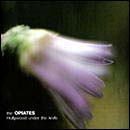 The past 18 months have been busy ones for Billie Ray Martin. She has released records under her own name as well as with Hard Ton, The Crackdown and now, along with Robert Solheim, as The Opiates.
The past 18 months have been busy ones for Billie Ray Martin. She has released records under her own name as well as with Hard Ton, The Crackdown and now, along with Robert Solheim, as The Opiates.
Over 3 years in the making, ‘Hollywood Under The Knife’ sees BRM reunited with the cool, spacious electronic sound of her first and most successful late eighties band; Electribe 101. Martin possesses the kind of voice that makes an impression; a soulful and haunting wail of a thing, perfect for the glamorous and tragic figures she sings about here.
She channels Warhol transexual Candy Darling on the lead single Rainy Days and Saturdays, an obvious and self-conscious nod to The Carpenters and a somewhat foolish attempt to try and make in this case. Much more successful is the second track ‘I’m Not Simone Choule’, a reference to the suicidal character in Roman Polanski’s film ‘The Tenant’ and a suitably chilling and densely structured song that takes time to reveal itself with BRM completely occupying the track like the ghost she’s singing about.
Apart from the Numan-esque synths of the pounding and compelling ‘Reality TV’ and the Giorgio Moroder gallop of the previously released ‘Candy Coated Crime’ this is a mainly downbeat collection of odes to despair and destructiveness and one that gets under the skin due to the hot and cold of Martin’s voice and Solheim’s synths and the high quality of song writing evidenced here; ‘Silent Comes The Nighttime – Again’ takes subtle cues from early house music and is in many ways the second part of Electribe 101’s biggest hit ‘Talking With Myself’ with Martin literally talking to herself again and ‘Jalousies and Jealousies’ melody weaves its way in and out of Martins double tracked, stuttered vocals beautifully.
Recommended.
It’s a foggy night in London town (Whetstone actually) and I’m sitting backstage at the All Saints Arts Centre, which is a rebranded church hall where The Who (in their High Numbers era) played in 1964. I’m chatting to the ever-approachable Billy Walton under the eagle eye of Plus One, who’s trying to make sure that I don’t morph into Lynn Barber mid-interview; as if. This is roughly how the conversation went.
AM I’ve been following the tour on Facebook this time and it seems like it’s been a bit of a blast.BW It’s been great; the turnouts have been wonderful and the shows have been going fantastic and it’s nothing but happiness all round.
AM The UK’s interesting because it’s always been a good territory for bands like yours hasn’t it?
BW Yeah, guitar rock’s still alive and rock ‘n’ roll’s still breathing.
AM It’s been nearly 2 years since we last met up, what’s been happening in that time?
BW Actually, with my band we’ve been playing gigs and we’ve just recorded a new album called “Crank It Up!” and we’re very excited about it and we’re doing this tour pushing that. Myself, I’ve been playing with Southside Johnny and the Asbury Jukes. I didn’t do the UK tour this time because I was doing my tour and finishing the album and I fly back next Thursday and play with The Jukes again up in Rhode Island, so it’s been a very busy summer, it’s been wonderful.
AM You mentioned the album, I’ll come back to that in just a minute but I’ve noticed that you’ve become really popular with the Jukes fans as well.
BW It’s been great, Jukes fans are music lovers and the Jukes are a unique band where nothing’s polished and you never know what’s going to happen and that’s what’s great and the fans dig into that because it’s happening in real time; even we don’t know what’s going to happen next.
AM As a guitar player in The Jukes, there are some big shoes to fill there when you look at who’s been there in the past.
BW Yeah Little Steven (van Zandt) and Bobby Bandiera who’s a great, great player but we’re the next evolution of The Jukes, so it’s a cool thing and to hear Southside sing every night is a pleasure.
AM And Southside seems to be pushing outwards again with The Poor Fools.
BW He’s always on the go, which we all are. We all want to do different projects, do different things and evolve musically still, no matter what.
AM So, tell me about the new album then.
BW The new album; I’m very proud of it. It’s a little bit more laid back than “Neon City”; the songwriting is a step up. I’ve been doing some writing with this guy Randy Friel from Scullville Studios; he’s a good friend of mine, a great piano player and we’ve been hitting it off and writing, we just come with ideas and magic happens.
AM With the kind of touring schedule that you’ve got with The Jukes and the Billy Walton Band, how do you actually manage to fit in the writing and the recording?
BW I’m still trying to figure that out. We did it and after we got the project done, you realise you can’t believe you made the time to do that. It’s just constantly working and then we’re going to be on to the next album and on to the next Jukes show and the next Billy Walton Band tour, constantly moving, constantly evolving and trying just to get out there and play guitar.
AM So, have you got a home studio that you use where you put ideas together?
BW No, I don’t personally because I like being a guitar player and a songwriter instead of an engineer; I know a little bit about it and I have done it in the past to put ideas down but when you’re in a creative mode, you want to capture the creative mode instead of trying to get this take. You want to stay in that creative mindframe, for me anyway.
AM You and William (Paris) have obviously been together for a while now and I’ve seen that on stage it’s almost telepathic sometimes, so do you come along with an idea for a song and you work on it together?
BW Yeah, constantly. He has ideas he throws at me and I throw them back and they evolve. We do some jamming in the middle of songs and sometimes that sparks something; every song comes in a different way. It’s not like it’s cut and dried; okay, next song.
AM It’s a bit like that that Keith Richards quote that you don’t write songs, they’re just in the air and you have to pick them out.
BW Well, he had a few. We were talking earlier about Randy Friel, where the magic was happening. If you like somebody and you surround yourself with good people, have a good time, pop open a beer, have some fun, do some writing and just let it go then you’re creating instead of just champing at the bit trying to put a song down to get it out there. That’s what’s different about this album. Not running out of time, just doing it.
AM So is most of the material on the new album your own songs?
BW Yes, it all is; no covers.
AM That’s great, I’ll look forward to hearing it. I understand there was some original financing on the project as well.
BW We did the Kickstarter programme, which is a great, great programme not only for music but for all the arts; for people who want to put movies out or artists. You’re preselling your album and offering alternatives and people really dig in to it and it’s great for the artist because they don’t always have the money upfront and it gives you the ability to create more instead of being held back financially.
AM That’s great, thanks for your time Billy.
BW Thank you.
And that should have been the end of it; get a few photos, have a couple of Buds and enjoy the bands for the rest of the night. I’ve done a live review of the band already and I’ve seen them a couple of times so there’s no reason to do another review. Okay, I was wrong; I’ve seen the Billy Walton Band twice doing support sets and tonight they’re headlining which is a whole new ball game.
The support band is The Stone Electric who play a steady opening set which brings to mind early 70s British bands like Free and Stone the Crows or, more currently, The Black Crowes and they feature the powerful voice of Noni Crow. They get a fairly good response, and the audience are pretty nicely warmed up for the headliners.
The nucleus of BWB is Billy Walton and bass player and co-writer William Paris joined on this tour by drummer Simon Dring and tenor sax player Richie Taz and from the moment they take the stage it’s a bit like being hit by a hurricane. We’re only halfway through the first song when Plus One makes the observation that Billy’s an incredible guitar player, which is an understatement if anything but I’ll come back to that later.
Billy and William have played together for several years now and could add any other competent musicians to the mix and it would work out pretty well. This time, however, Simon Dring and particularly Richie Taz (who plays on Billy’s new album), add many different options to the usual BWB power trio set, including the opportunity to throw in a couple of Springsteen covers, “Badlands” and “Rosalita”. For most bands these would be brave choices but the quality of the playing, particularly the interplay between guitar and tenor sax, is so good that the band produce stunning versions of these songs which have all the power of the E Street Band originals.
The set lasts for a couple of hours and is a mix of material from the new album, older Billy Walton originals and a few covers thrown in. Although Billy Walton is a great rock player, he’s capable of a lot more besides; the set tonight includes the live favourite “Soul Song”, the country blues of “Deal with the Devil” and the early Springsteen feel of “The Deal Went Down” (both from the new album) and the band sound tremendous in all of these styles.
What makes BWB so special live isn’t just the outstanding technical ability; the band know how to entertain and to sell the songs as well. They play with a huge sense of enjoyment and aren’t afraid to inject a bit of humour into the show. The solos and jams can lead anywhere; how about breaking into the Surfaris’ hit “Wipeout” or the “Peter Gunn” theme during a solo or throwing in a verse from The Who’s “Baba O’Reilly” in the middle of “Badlands”? The band knows how to pace the set, picking the moments for the slower-paced material before building up a head of steam for a barnstorming finish and then it’s all over, leaving the band and the audience completely drained.
Do yourselves a favour and go out and see the Billy Walton Band next time they’re in the UK; I’ll even let you know when it is. Any band that can make such a glorious noise with an audience of about 150 in a church hall in Whetstone deserves to reach a bigger audience.
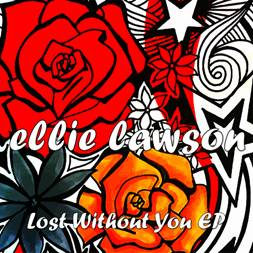 Sometimes the review game can be really rewarding; you hear great new music and get to write about it. Sometimes it can be really frustrating. Guess which category this EP from Ellie Lawson falls into?
Sometimes the review game can be really rewarding; you hear great new music and get to write about it. Sometimes it can be really frustrating. Guess which category this EP from Ellie Lawson falls into?
But let’s get the facts out of the way first. The EP is out on November 15 and there are 5 tracks: “Lost Without You”, “Change the Way”, “How Hard We Try”, “Friends” and “Ba Ba Da”. You can get all the official material on Ellie on her Facebook page
http://www.facebook.com/ellielawsonmusic including samples from the EP and a free download. Just out of interest, why do we have to “like” something before we get the chance to hear it?
So why is it so frustrating? Well, the first song “Lost Without You” is a good example. From the outset, it’s obvious that Ellie has a strong and very distinctive voice; you could justifiably compare it to early Joni Mitchell. The trite subject matter of the song (escaping from the debauchery of the celebrity lifestyle) is such a cliché that the power of such a great voice is almost completely wasted.
The cutesy arrangements on “Change the Way” and “Ba Ba Da” don’t help. Ukulele and whistling might have seemed like a great way of sounding distinctive, but the finished product just sounds affected and twee and certainly not the best way of showcasing a strong and original voice. But that’s only 3 of the 5 songs on the EP.
“How Hard We Try” is built on a trip-hop feel with a nice acoustic guitar figure to push the song along and “Friends” is a much more traditional arrangement with acoustic guitar and strings. It’s a personal opinion, but these songs work much better because they use a more traditional framework. These 2 songs are enough to show that Ellie Lawson is a genuine talent and she should be a success in her own right in the long term.
This EP has a feel of the clever kid at school who wants to show how varied their influences are and how many different styles they can work in instead of a showcase for a great vocal talent and that’s what’s frustrating. With a different set of songs and less quirky arrangements, this could have been a great introduction to an artist with a truly original and memorable voice. I’m sure that there are better things to come.
 There’s a difficult choice here. Metamono are a group/collective partly consisting of ex-Shamen and Bomb the Bass personnel and they have a manifesto. Before we go any further, it’s probably a good idea to have a look at it; it won’t take long. You can see it here:
There’s a difficult choice here. Metamono are a group/collective partly consisting of ex-Shamen and Bomb the Bass personnel and they have a manifesto. Before we go any further, it’s probably a good idea to have a look at it; it won’t take long. You can see it here:
http://www.youtube.com/watch?v=7U750IlDW9I. The difficult choice is whether to talk about the music or the manifesto; ok, manifesto it is.
The basic premise is that digital technology is making music flaccid and predictable and I’ve got a lot of sympathy with that; before sampling, you would have asked a musician to play something which fitted in with the piece you were creating but now you just sample something, timestretch it and slot it in. So far, so good. The Metamono response to this situation is to impose strict limitations on the way their music is created and use these restrictions to ensure that creativity becomes more important than technology; again, I have a bit less sympathy with that position but then we get to the details of the creative restrictions.The first restriction is a bit of a strange one; Metamono will not use microphones. It’s strange because microphones aren’t digital technology and they predate the analogue synthesisers which Metamono feature by about a century. Even the industry standard Shure SM58 was launched in1966, about 5 years before analogue synthesisers appeared on the commercial market. Maybe I’m being a bit pedantic, but why is not using microphones a big deal, particularly when there aren’t any vocals? And how did they record the voiceover for the manifesto?
On to the rest of the manifesto; no digital sound sources or sampling, no mechanical sound generation or digital processing, no overdubs or remixes and digital processing and editing will only be used when no alternative is available. Composing and mixing will be done simultaneously and only previously-used or home-made instruments will be used. There’s also a reference to not being afraid of mono. Ok, that’s enough of the manifesto for now. The first full-scale Metamono release, the “Tape EP”, is out on October 31 as a 10-inch single and download, so what’s it like?
There are 4 tracks; XeF4, H2NS, Metahaze and Emptygamezone and they all sound a bit like you would expect them to sound if you had read the manifesto. There are strong suggestions of Kraftwerk and Sheffield in the ‘80s. It’s very atmospheric; H2NS sounds like wandering through a disused warehouse in the dark with water leaking through the roof, while Metahaze has the feel of a car journey through a busy city at night with a dub reggae bass in the background. The EP as a whole sounds something like a little-known 1990 Rough Trade EP “Journey Through the New York Underground” by Metro with a few more unvarnished edges and corners; it’s certainly worth a listen if you want something a bit out of the ordinary.
Which brings us back to the manifesto again. I’m always a bit uncomfortable with any artistic work which is made in accordance with a strict set of rules, particularly when the manifesto isn’t particularly consistent. In this case, the use of some digital technology and the refusal to use perfectly acceptable analogue technology seems a bit perverse. Popular music has evolved by adapting new technologies such as multi-track recording, amplification and sampling and finding creative uses for them. It’s inevitable that these technologies will have a honeymoon period where they are over-used (Autotune for example) before becoming just another tool in the musician or producer’s box. At a time when digital technology is now producing results which are comparable to analogue, it seems a strange to restrict your music making to purely analogue techniques.
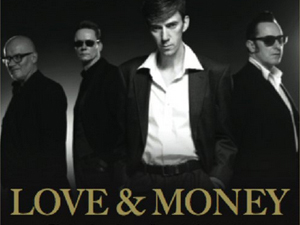 17 years since Love and Money broke up, apparently for good, they’re back. After reforming for a one-off show as part of Celtic Connections 2001 to play their albums “Strange Kind of Love” and “Dogs in the Traffic”, the band decided that it worked so well they should take the show out on tour. Which is why I’m at Shepherd’s Bush Empire with PlusOne to watch Love and Money in London.
17 years since Love and Money broke up, apparently for good, they’re back. After reforming for a one-off show as part of Celtic Connections 2001 to play their albums “Strange Kind of Love” and “Dogs in the Traffic”, the band decided that it worked so well they should take the show out on tour. Which is why I’m at Shepherd’s Bush Empire with PlusOne to watch Love and Money in London.
Unsurprisingly, there are a lot of Scots in the audience which is fiercely and vociferously partisan. The venue isn’t quite full, but the enthusiasm on display more than makes up for that; they’re all here to see the band triumph.
This is the classic Love and Money line-up with the addition of Ewen Vernal (ex-Deacon Blue among others on bass) and the wonderful Frazer Spiers on harmonica and backing vocals and they’re obviously up for a good show.
The musicianship is exceptional throughout as the band do their bit to showcase the well-crafted songs, James Grant’s baritone vocals and exceptional guitar work. James Grant is the perfect frontman; stick-thin, suited, in shades and able to entertain the audience between songs with stories about BB King, Tina Turner, Simply Red and his dad’s life in Glasgow.
The night is split into 2 halves. The first half is the whole of the 1991 album “Dogs in the Traffic”, which the band obviously feel is slightly less popular, followed, after the interval, by all of “Strange Kind of Love”. Whatever the band might think, there are plenty of highlights in the first half including “Whisky Dream” and the anthemic “Looking for Angeline”. “Pappa Death” shines out from the set as a song which was made for live performance; the album version seems insipid in comparison with version delivered tonight.
The “Strange Kind of Love” half of the performance features all the tracks except one from the album. The squeaky-clean, shimmering Gary Katz production of the album is impossible to recreate live, so the songs are much more raw, but no worse for that, relying on great playing rather than studio expertise. It’s difficult to pick out highlights because the performances are all great but the audience are all shouting for the big single “Jocelyn Square” and it’s a huge moment when the guitar intro finally kicks in and the band launch into a powerful version of a great song about lost love and innocence.
The song from the album which doesn’t feature in the set is saved for the encore; “Walk the Last Mile” is dedicated to the late Bobby Paterson, former bass player with band who died in 2006. It’s a touching tribute to a great musician, who is obviously still missed by the rest of the band. Throughout the evening James Grant makes references to Love and Money working together again and confirms this towards the end of the set, announcing a new album and full UK tour next year. The band go out on “Candybar Express”, which James Grant describes as “the most moronic song I ever wrote” and it’s all over.
Love and Money are back, they’re as good as they ever were and they’re recording new material. If you like songs that are well written and well performed with a nice line in Glasgow patter between songs, then you really should get out to see these guys next year.
 British metal; it’s a lesson in survival. After the nuclear holocaust, we’ll still have British metal bands and their legions of devoted fans. Listening to “This Day is Mine”, the single taken from Rise to Remain’s debut album “City of Vultures”, you can understand why.
British metal; it’s a lesson in survival. After the nuclear holocaust, we’ll still have British metal bands and their legions of devoted fans. Listening to “This Day is Mine”, the single taken from Rise to Remain’s debut album “City of Vultures”, you can understand why.
The song opens with a 4-bar mid-tempo guitar intro before a thunderous volley of floor toms and bass drum batters the way into the body of the song. It’s all powered along by a monster of a guitar riff and packs everything you expect from a great metal record into three and a half minutes.
The band have the classic New Wave of British Heavy Metal line-up of bass, drums, two guitars and singer and they’re descended from that movement in one other way; the singer is Austin Dickinson, son of Iron Maiden’s Bruce Dickinson. It’s all there; the playing is tight, technically brilliant and very aggressive with the two guitars combining effectively in various ways including the harmony playing that Thin Lizzy fans will remember, the rhythm section is a metronomic powerhouse and Austin Dickinson has a great rock voice.
“This Day is Mine” crams in almost every metal trick you can imagine including some great shredding, breakdowns, great vocal harmonies and a big crash ending. The band is already being tipped as the next big thing in the metal magazines and, on the evidence of this single, it’s easy to see why. They’re currently on tour in support of their debut album “City of Vultures” (released on September 5). If you’re at all interested in British rock, they’re well worth seeing. Find out more at:
Whether you love metal or loathe it, you certainly can’t ignore it. Out on September 19.
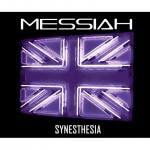 Well, it’s a bold move to name your band Messiah. It creates a certain level of expectation which, ultimately, you have to live up to. At a time when careers are created by appearing on a talent show singing someone else’s songs, it’s great to be reminded that some bands actually do it the right way by learning to play, performing live and writing songs.Until very recently, Messiah were a 5-piece from Edinburgh who recently released their debut album “Synesthesia” (if you want to know what it means, just google it). Now they’re a 4-piece, deciding to carry on rather than split following the departure of their lead guitarist and songwriter. It’s a brave decision, but is it the right one?
Well, it’s a bold move to name your band Messiah. It creates a certain level of expectation which, ultimately, you have to live up to. At a time when careers are created by appearing on a talent show singing someone else’s songs, it’s great to be reminded that some bands actually do it the right way by learning to play, performing live and writing songs.Until very recently, Messiah were a 5-piece from Edinburgh who recently released their debut album “Synesthesia” (if you want to know what it means, just google it). Now they’re a 4-piece, deciding to carry on rather than split following the departure of their lead guitarist and songwriter. It’s a brave decision, but is it the right one?
There are a lot of good things to say about the album, but there are a lot of jarring little things which don’t quite work as well. The songs are inventive melodically but often lyrically limited and the influences on the lead guitar parts are sometimes painfully easy to pick out. The overall sound is obviously influenced by the Stone Roses and the mid-90s Britpop sound, particularly the vocal style but some of the lead guitar work is very derivative.
When the songs, performances and production on the album gel, the results are outstanding. The album’s second track, “Fantasia”, with the tribal floor tom intro and the vaguely menacing harmonies works perfectly and “Lazy Daisy” is a great Faces/Black Crowes –style riff monster which doesn’t have to mean anything; it just sounds great. The penultimate track “Let the Good Times Roll” is an acoustic piece which sounds great if you don’t analyze the lyrics too closely and ignore the overdone acoustic guitar soloing under the vocal. Some of the production and arrangement tricks on the album are a little bit too obvious; a bit too much unison playing with guitar and vocal, bass and guitar and drums and guitar. Maybe the problem is that a first album is so much easier to get out now.


